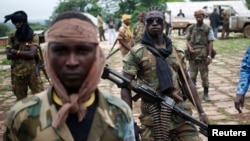Uganda said on Tuesday its forces in Central African Republic (C.A.R.) had clashed for the first time with fighters from Seleka, a mainly Muslim rebel force, killing 12, and would pursue them as part of a campaign against the Lord's Resistance Army (LRA).
“Seleka had never tasted our fire, I think it was important that they taste our fire so that they are careful - they are in bed with LRA and we shall treat them as such,” Paddy Ankunda, spokesman for Uganda People's Defense Forces (UPDF) said.
The LRA, led by Joseph Kony, is using C.A.R. as one of its rear bases for attacks across a thickly forested region straddling CAR, South Sudan and the Democratic Republic of Congo.
Uganda is leading a 5,000-strong African Union regional force hunting down the rebels, widely known for their brutality, but has no specific mandate to confront Seleka.
Ankunda accused Seleka of forcing civilians to give food and medicine to the LRA and facilitating the group by trading ivory and minerals with them. That gave UPDF the justification to target Seleka, he said.
“We know we don't have that mandate but since they are in bed with our enemy we'll treat them as such,” he said.
LRA, which fought the Ugandan government for nearly two decades from the country's north, is known for its ruthlessness, including mass abduction of boys and girls, hacking limbs off victims and raping them.
Ankunda said Seleka had attacked their positions on Sunday and Monday.
“Seleka attacked our forces... we punished them very severely,” he said, adding that 12 Seleka fighters, including a Colonel, had been killed by the UPDF while a Captain was captured.
One UPDF fighter died after sustaining injuries in the fight, he said.
A senior Seleka official on Monday told Reuters, 15 of their fighters and three UPDF soldiers were killed in the clash.
Seleka, a coalition of mainly Muslim rebels from northern CAR, seized power last year, but its time in Bangui, the capital, was marked by rights abuses, prompting mainly Christian self-defense militia to spring up across the country.
Nearly a million people - about a quarter of the population - have been forced from their homes in cycles of violence.
Seleka leaders stepped aside earlier this year under intense international pressure, but tit-for-tat killings continue, and the former rebels still occupy pockets of the country, mainly to the north of Bangui.





